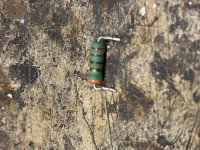What is this from?
Is it completely open?
If not, what does it read?
Sometimes an unusual band means that it has special features/properties.
Are there any similarly marked resistors in the same board that you could use as a reference?
Is it completely open?
If not, what does it read?
Sometimes an unusual band means that it has special features/properties.
Are there any similarly marked resistors in the same board that you could use as a reference?
It’s from an Orion HCCA 8000.1
It’s completely open no reading on it
There are no other resistors in the amp to reference .
1 side of it goes to the collector of the pnp drivers for the power supply fets and the other side connects to a disk cap the goes to ground .
Any ideas on the value ? Maybe a 22 ohm ?
It’s completely open no reading on it
There are no other resistors in the amp to reference .
1 side of it goes to the collector of the pnp drivers for the power supply fets and the other side connects to a disk cap the goes to ground .
Any ideas on the value ? Maybe a 22 ohm ?
With the make/model, it may help others to know where to look if they have one in the shop.
Without it, what's the resistance between the PNP collectors and ground?
Without it, what's the resistance between the PNP collectors and ground?
How did you determine that the disk cap went to ground?
It wouldn't make much sense for the resistor to go from ground through a capacitor and back to ground.
It wouldn't make much sense for the resistor to go from ground through a capacitor and back to ground.
My mistake .
1 side of the resistor connects to the collector of the PNP driver transistors which also connects to 1 terminal of the relays .
The other side connects to a disk cap a 0.1uf The other side of that cap connects to pins on the audio driver boards .
So that resistor controls the relays without of I can’t get the relays to engage
1 side of the resistor connects to the collector of the PNP driver transistors which also connects to 1 terminal of the relays .
The other side connects to a disk cap a 0.1uf The other side of that cap connects to pins on the audio driver boards .
So that resistor controls the relays without of I can’t get the relays to engage
OK. I'm sorry but I can't help with this one.
The 22 ohms that you guessed is likely right but I can't be sure.
Hopefully someone with an amp on hand will help.
The 22 ohms that you guessed is likely right but I can't be sure.
Hopefully someone with an amp on hand will help.
3v won't burn a 22 ohm resistor.
Is there excessive noise on the secondary ground? Or is it only 3v of straight DC?
Is there excessive noise on the secondary ground? Or is it only 3v of straight DC?
Does that noise correspond to the frequency of the output stage or the frequency of the PS?
Could you have a leaking insulator or some other short from the heatsink mounted components to the heatsink?
Could you have a leaking insulator or some other short from the heatsink mounted components to the heatsink?
The board is out of the heatsink .
No matter what value resistor I put in that location it gets red hot instantly and burns the resistor .
That resistor is connected between primary and secondary grounds .
So I’m wondering if I have a shorted component somewhere .
If I pulse the remote wire the relays will click on then click back off instantly.
So at this point I guess I will have to go back through the amp and start checking
No matter what value resistor I put in that location it gets red hot instantly and burns the resistor .
That resistor is connected between primary and secondary grounds .
So I’m wondering if I have a shorted component somewhere .
If I pulse the remote wire the relays will click on then click back off instantly.
So at this point I guess I will have to go back through the amp and start checking
- Home
- General Interest
- Car Audio
- Resistor Value
